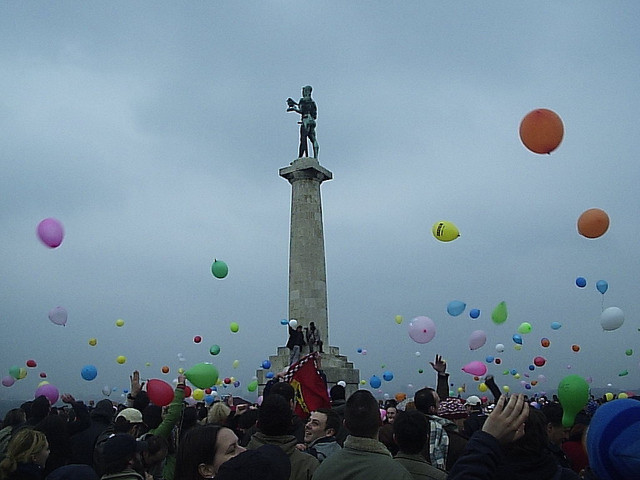In Serbia, A Gay Rights Struggle Tests EU Efficacy

A gay rights march scheduled in Belgrade, Serbia, this weekend has been moved indoors after administration officials banned the public demonstration.
Though the government cited security concerns, LGBT community activists suspected intolerance was at the root of the ban, pointing out that this is the second year in a row the event was shut down. If they’re correct, the implications of the incident could reach far beyond Belgrade -- all the way to Brussels.
Serbia is preparing to join the European Union, but must first prove itself a competent protector of human rights. The cancellation of Thursday’s event was ill-received abroad, and could very well jeopardize the country’s pending ascension.
But Serbian Prime Minister and Chief of Police Ivica Dacic defended the government’s decision.
“We believe that at this moment Serbia does not need clashes and victims, and that's why we banned the gatherings,” he said to the Associated Press, adding that anti-gay extremist groups had also been banned.
The head of Serbia’s Christian Orthodox Church, Patriarch Irinej, was far less judicious. He called the planned pride event a “parade of shame” in a statement earlier this week, asking the government to shut it down.
But the administration maintains that security concerns alone -- neither church requests nor general intolerance -- motivated the ban. It is true that the last time this event took place, in 2010, members of far-right groups harassed the participants and injured dozens. Today, those groups are still well-established and eager to resist LGBT progress in any way they can.
But civil rights activists are not convinced of the government’s good intentions. Goran Miletic, an organizer of the weekend pride event, told the Associated Press that the ban constituted a “full capitulation of the state in the face of extremists.”
Officials from both the United Nations and the European Union also condemned Serbia’s decision.
“Responding to violent attacks against a vulnerable community by banning them from peacefully gathering and expressing themselves further violates their fundamental human rights," said UN High Commissioner for Human Rights Navi Pillay in a statement. "States should confront prejudice, not submit to it.”
In Brussels, a spokesman for EU Enlargement Commissioner, Štefan Füle, said the parade ban reflected poorly on Belgrade.
“We take note with regret of the decision of the Serbian authorities to ban the gay pride parade for the second year in a row," said Peter Stano, spokesman for Füle.
He added that Füle is "particularly committed to seeking from candidate countries that they fully embrace fundamental rights and values,” implying that the decision could hurt Serbia’s chances of joining the European Union.
Serbia received full candidate status in March, and hopes to become a full EU member by 2014. But progress toward that goal has slowed slightly since President Tomislav Nikolić took office in May; his predecessor, Boris Tadić, had been more proactive about Serbia’s EU ascension.
Still, Nikolić has promised to stay on the EU path. And although the parade ban misstep may be detrimental, it is ultimately unlikely to obstruct Serbia’s ascension.
Füle will continue working with Belgrade to ease the path to integration. He is currently working on an annual report on the accession progress of Balkan countries, which will be published next week. Gay rights is only one of several issues that must be addressed, which include mob violence and relations with Kosovo.
Meanwhile, Serbia’s LGBT community will continue to fight for tolerance in this conservative Balkan country -- with or without support from EU officials. In Belgrade, Miletic told the Associated Press that he and his fellow demonstrators had no choice.
“Pride is not a circus that will leave this city,” he said. “We are staying here; this is where we live.”
© Copyright IBTimes 2024. All rights reserved.






















